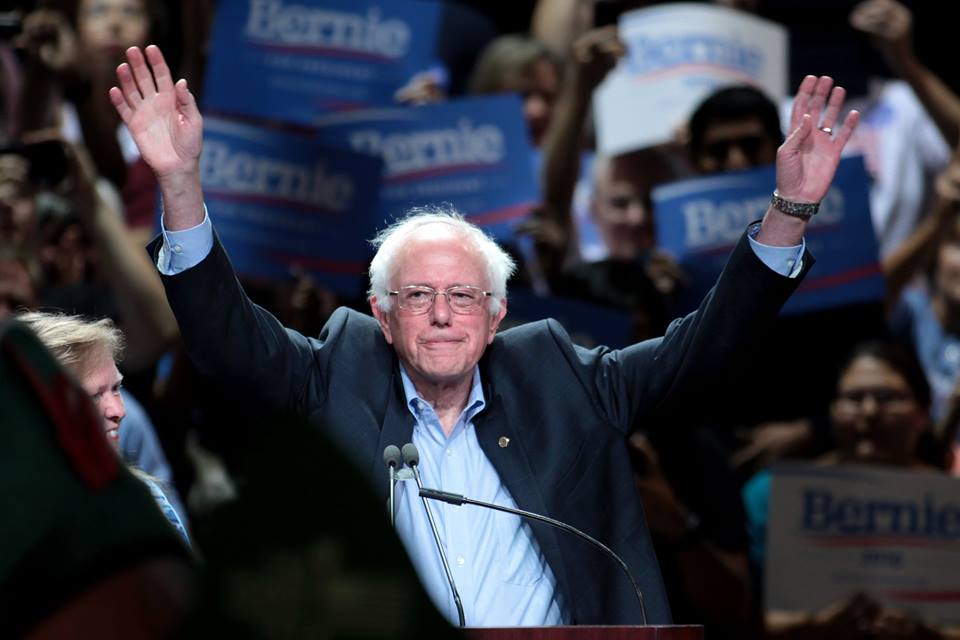
“The third rail of a nation’s politics is a metaphor for any issue so controversial that it is “charged” and “untouchable”; any politician or public official who dares to broach the subject will invariably suffer politically.”
Reforming our marijuana laws and the greater Drug War have often been declared a “third rail” in American politics, right along with cutting Social Security, something you just can’t support. However, Bernie Sanders was forceful during the first Democratic primary presidential debate (#DemDebate) about the need to rethink the War on Drugs, reform our criminal justice system and he even declared his support for marijuana legalization.
Hillary Clinton, to her credit, was also very good on criminal justice reform, but she seemed to be playing a game of catch-up with Sanders, in my opinion. On marijuana legalization, it was great to hear Clinton declare her support for medical marijuana, but the “wait-and-see” answer on legalization is a very Clintonesque political position that allows her to dodge the issue; while you can pay lip-service to keeping nonviolent people out of the criminal justice system, laws actually have the change, and that starts with ending marijuana prohibition.
The other candidates were also very good on criminal justice reform when they had the opportunity to speak, but let’s be honest, the debate was really between the establishment Clinton and the insurgent Sanders. While Martin O’Malley, to me, looks and sounds very presidential, I don’t see him gaining much traction. The former Republicans, Jim Webb and Lincoln Chafee, while I like both of them and they both look good on paper, aren’t likely to appeal to the Democratic base that votes in the 2016 primary.
Political pundits were quick to announce Hillary Clinton the winner of the debate as she put on a rather fantastic debate performance and looked presidential and confident on the big stage. However, the people saw something different, according to focus groups and online polls. Ordinary viewers saw Sanders as the victor and it wasn’t even close. Focus groups by CNN, Frank Luntz on Fox News and Fusion all declared Bernie Sanders the winner. While no one cited his stance on marijuana, his common-sense answer played into one of his greatest strengths–his authenticity.
Sanders’ performance certainly pleased his supporters as $1.3 million was donated following the debate. Some have seen a similar dichotomy between the pundits and the people as Dan Pfeiffer, former Senior Advisor to Barack Obama, noted on Twitter, that the media establishment supporting Clinton, while the people supporting Sanders, was very reminiscent of the Obama/Clinton nomination battle:
Clinton had a great night, but Sanders winning the focus group and online polls, but losing the pundits is reminiscent of Obama in 07-08
— Dan Pfeiffer (@danpfeiffer) October 14, 2015
Anderson Cooper did a great job cutting to the heart of the perceived weaknesses of the Democratic candidates. Cooper forced Bernie Sanders to defend his “democratic socialism” label and I thought that he did a good job on that. In the future, I think that Sanders should mention Franklin Roosevelt’s New Deal policies as an example of democratic socialism and Clinton opened the door for that tactic in the next debate, as she stated that the United States needed a “New” New Deal.
Clinton was forced to answer whether she makes decisions based upon political expediency and her answer on marijuana legalization is the definition of political expediency in a Democratic primary. It is very easy to state your support for medical cannabis, but when as Clinton ever done anything for the cause? Anything to support putting an end to the needless suffering of sick and disabled patients that could benefit from cannabis? She still needs to wait and see on Colorado’s marijuana legalization system? How much longer does she need?
It will be interesting to see how the polls shake out following this debate. I predict a bump for Bernie Sanders just because his name recognition will increase and the Democratic base will actually support democratic socialist policies now that they’ve had an opportunity to hear from Sanders himself. I think that Clinton will remain steady; I don’t think that a large number of people will jump to her, but I don’t think that she did much to hurt herself.
I think that O’Malley will scoop up Chafee and Webb supporters and we will be in a three-way race for a bit, unless Joe Biden rounds us up to four. I’ll check back to this post as the polls come out and we’ll just see how my prognostication pans out.
Hopefully, more politicians in the future will learn from Bernie Sanders, not only on marijuana policy, but also on the fact that you can be authentic and yourself, there is no need to flip and flop and “evolve” as the political winds blow. If more politicians will follow in Sanders’ footsteps, then his political revolution, that Jim Webb dismissed, will continue beyond just one politician.
Some of the results of last night’s debate focus groups:
CNN:
Fox News:
Fusion:






